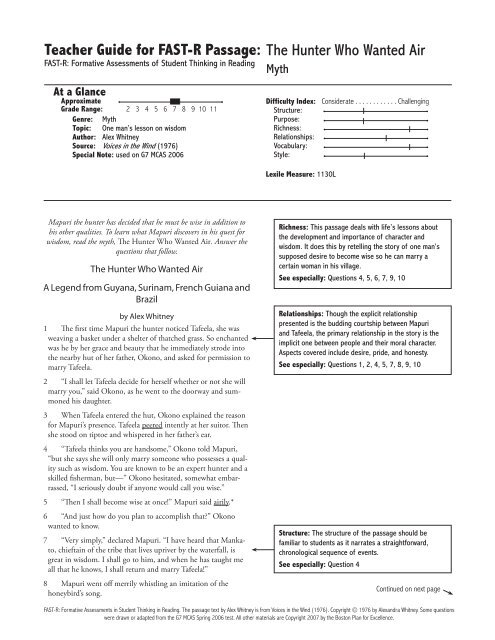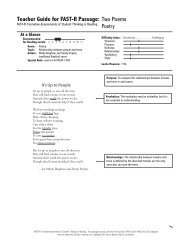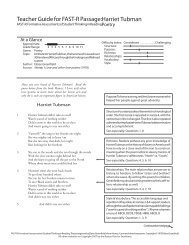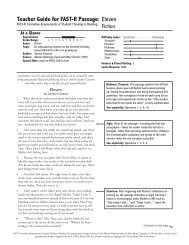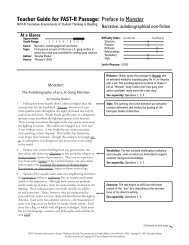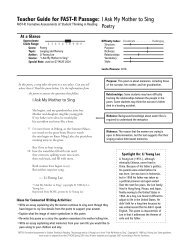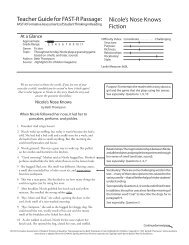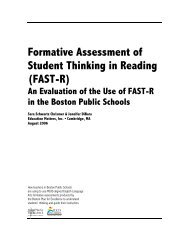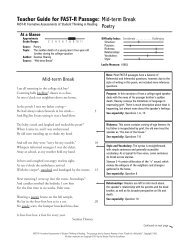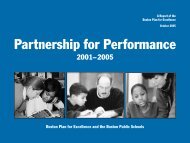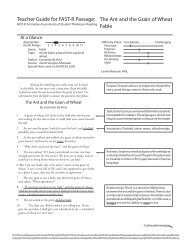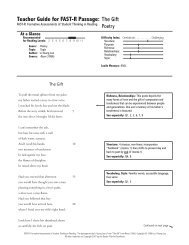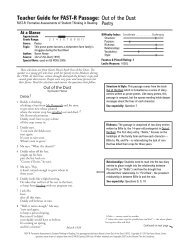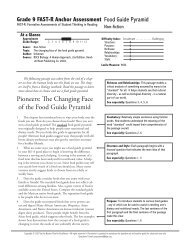The Hunter Who Wanted Air - Boston Plan for Excellence
The Hunter Who Wanted Air - Boston Plan for Excellence
The Hunter Who Wanted Air - Boston Plan for Excellence
You also want an ePaper? Increase the reach of your titles
YUMPU automatically turns print PDFs into web optimized ePapers that Google loves.
Teacher Guide <strong>for</strong> FAST-R Passage:<br />
FAST-R: Formative Assessments of Student Thinking in Reading<br />
At a Glance<br />
Approximate<br />
Grade Range: 2 3 4 5 6 7 8 9 10 11<br />
Genre: Myth<br />
Topic: One man’s lesson on wisdom<br />
Author: Alex Whitney<br />
Source: Voices in the Wind (1976)<br />
Special Note: used on G7 MCAS 2006<br />
<strong>The</strong> <strong>Hunter</strong> <strong>Who</strong> <strong>Wanted</strong> <strong>Air</strong><br />
Myth<br />
Difficulty Index: Considerate . . . . . . . . . . . . Challenging<br />
Structure:<br />
Purpose:<br />
Richness:<br />
Relationships:<br />
Vocabulary:<br />
Style:<br />
Lexile Measure: 1130L<br />
Mapuri the hunter has decided that he must be wise in addition to<br />
his other qualities. To learn what Mapuri discovers in his quest <strong>for</strong><br />
wisdom, read the myth, <strong>The</strong> <strong>Hunter</strong> <strong>Who</strong> <strong>Wanted</strong> <strong>Air</strong>. Answer the<br />
questions that follow.<br />
<strong>The</strong> <strong>Hunter</strong> <strong>Who</strong> <strong>Wanted</strong> <strong>Air</strong><br />
A Legend from Guyana, Surinam, French Guiana and<br />
Brazil<br />
by Alex Whitney<br />
1 <strong>The</strong> first time Mapuri the hunter noticed Tafeela, she was<br />
weaving a basket under a shelter of thatched grass. So enchanted<br />
was he by her grace and beauty that he immediately strode into<br />
the nearby hut of her father, Okono, and asked <strong>for</strong> permission to<br />
marry Tafeela.<br />
2 “I shall let Tafeela decide <strong>for</strong> herself whether or not she will<br />
marry you,” said Okono, as he went to the doorway and summoned<br />
his daughter.<br />
3 When Tafeela entered the hut, Okono explained the reason<br />
<strong>for</strong> Mapuri’s presence. Tafeela peered intently at her suitor. <strong>The</strong>n<br />
she stood on tiptoe and whispered in her father’s ear.<br />
4 “Tafeela thinks you are handsome,” Okono told Mapuri,<br />
“but she says she will only marry someone who possesses a quality<br />
such as wisdom. You are known to be an expert hunter and a<br />
skilled fisherman, but—” Okono hesitated, somewhat embarrassed,<br />
“I seriously doubt if anyone would call you wise.”<br />
5 “<strong>The</strong>n I shall become wise at once!” Mapuri said airily.*<br />
6 “And just how do you plan to accomplish that” Okono<br />
wanted to know.<br />
7 “Very simply,” declared Mapuri. “I have heard that Mankato,<br />
chieftain of the tribe that lives upriver by the waterfall, is<br />
great in wisdom. I shall go to him, and when he has taught me<br />
all that he knows, I shall return and marry Tafeela!”<br />
8 Mapuri went off merrily whistling an imitation of the<br />
honeybird’s song.<br />
Richness: This passage deals with life’s lessons about<br />
the development and importance of character and<br />
wisdom. It does this by retelling the story of one man’s<br />
supposed desire to become wise so he can marry a<br />
certain woman in his village.<br />
See especially: Questions 4, 5, 6, 7, 9, 10<br />
Relationships: Though the explicit relationship<br />
presented is the budding courtship between Mapuri<br />
and Tafeela, the primary relationship in the story is the<br />
implicit one between people and their moral character.<br />
Aspects covered include desire, pride, and honesty.<br />
See especially: Questions 1, 2, 4, 5, 7, 8, 9, 10<br />
Structure: <strong>The</strong> structure of the passage should be<br />
familiar to students as it narrates a straight<strong>for</strong>ward,<br />
chronological sequence of events.<br />
See especially: Question 4<br />
Continued on next page<br />
FAST-R: Formative Assessments in Student Thinking in Reading. <strong>The</strong> passage text by Alex Whitney is from Voices in the Wind (1976). Copyright © 1976 by Alexandra Whitney. Some questions<br />
were drawn or adapted from the G7 MCAS Spring 2006 test. All other materials are Copyright 2007 by the <strong>Boston</strong> <strong>Plan</strong> <strong>for</strong> <strong>Excellence</strong>.
9 Early the following morning Mapuri ran to the river and<br />
leaped into his corial, the dugout canoe he had carved from a<br />
tree trunk. <strong>The</strong>n he paddled strenuously upstream until he heard<br />
the thunderous torrent of the waterfall.<br />
10 When he had pulled his dugout onto a sandy cove, he<br />
hastened toward a cluster of beehive-shaped huts set back from<br />
the riverbank. Amid the excited barking of dogs, he exchanged<br />
greetings with a group of villagers and told them he had come to<br />
see Mankato.<br />
11 Mapuri was led to a large thatched hut, roofed with paleyellow<br />
palm straws that swept gracefully to the ground. Seated<br />
cross-legged in the entrance was an ancient man with a magnificent<br />
head of graying hair.<br />
12 Mapuri stood be<strong>for</strong>e him and came to the point at once:<br />
“Mankato, I wish to learn how to be wise.”<br />
13 <strong>The</strong> old chieftain’s eyes twinkled from behind half-closed<br />
lids. “Be<strong>for</strong>e one can acquire wisdom, one must truly desire it,”<br />
he said.<br />
14 “I desire it more than anything else at the moment!” cried<br />
Mapuri.<br />
15 “<strong>The</strong>n you shall have your first lesson,” said Mankato, rising<br />
slowly to his feet. “Come, let us walk to the river.”<br />
16 When the pair arrived at the riverbank, Mankato told<br />
Mapuri to kneel in the shallow water. But as soon as Mapuri had<br />
done so, Mankato firmly pushed the young man’s head underwater<br />
and held it there <strong>for</strong> a moment or two.<br />
17 Choking and spluttering, Mapuri raised his head out of the<br />
river. <strong>The</strong>n he drew in great gulps of air.<br />
18 “What did you think about while your head was underwater”<br />
asked Mankato, seemingly unaware of his would-be pupil’s<br />
distress.<br />
19 “<strong>Air</strong>!” wheezed Mapuri.<br />
20 “What!” exclaimed Mankato. “Did you not think of your<br />
prowess in the hunt”<br />
21 “No!” gasped Mapuri. “All I could think of was air!”<br />
22 “Did you not think of your nets brimming with fish”<br />
persisted Mankato.<br />
23 “No,” said Mapuri, “I thought only of air!”<br />
24 “When you want wisdom as much as you wanted air, then<br />
shall you become wise,” said Mankato. And without a backward<br />
glance at Mapuri, the old man walked away.<br />
25 <strong>The</strong> long shadows of early evening lay on the river when<br />
Mapuri returned to his village. As he trod wearily past Okono’s<br />
hut, Tafeela emerged from the doorway.<br />
26 “Did you learn how to be wise, Mapuri” she asked.<br />
27 Mapuri hung his head and looked <strong>for</strong>lornly at his toes.<br />
“Alas, Tafeela, I have learned only one thing,” he said. “<strong>Air</strong> is<br />
more important to me than wisdom.”<br />
Vocabulary: Some language in the passage may be<br />
challenging <strong>for</strong> readers despite the considerate nature<br />
of the text involving words like “corial.” Unfamiliar words<br />
might include peered, torrent, strenuously, prowess,<br />
<strong>for</strong>lornly.<br />
See especially: Questions 1, 3<br />
Richness: Mapuri learns an important lesson about<br />
himself, his character, and his desires.<br />
See especially: Questions 7, 8<br />
FAST-R: Formative Assessments in Student Thinking in Reading. <strong>The</strong> passage text by Alex Whitney is from Voices in the Wind (1976). Copyright © 1976 by Alexandra Whitney. Some questions<br />
were drawn or adapted from the G7 MCAS Spring 2006 test. All other materials are Copyright 2007 by the <strong>Boston</strong> <strong>Plan</strong> <strong>for</strong> <strong>Excellence</strong>.
28 Tafeela’s eyes sparkled beneath her fringe of glossy black<br />
hair. “In that case,” she said, “I shall accept your offer of marriage.”<br />
29 Mapuri could scarcely believe his ears. “Kiriwani! Impossible!”<br />
he cried. “Surely you must realize that many, many moons<br />
and many, many suns will come and go be<strong>for</strong>e I will be able to<br />
claim wisdom!”<br />
30 Tafeela laughed softly. “That may be true, but you possess<br />
another quality more valuable than all the game in our <strong>for</strong>est,<br />
more priceless than all the fish in our river: honesty. And<br />
honesty, Mapuri, is the first step on the path to wisdom.” said<br />
Tafeela.<br />
Style: <strong>The</strong> legend of the hunter who wanted air is a<br />
retelling of a mythical story that incorporates description<br />
and dialogue to communicate the complexity of life,<br />
desire, and relationships.<br />
See especially: Questions 5, 8, 10<br />
Purpose: <strong>The</strong> purpose of the passage is to communicate<br />
the importance of honesty as an aspect of character to<br />
be valued over acts of pride or prowess.<br />
See especially: Questions 4, 5, 7, 9, 10<br />
* airily — breezily, dismissively, as if it will be easy<br />
From Voices In the Wind by Alex Whitney<br />
Spotlight On: Myths and Legends<br />
<strong>The</strong> word “myth” comes from the Greek word “mythos,”<br />
meaning “story.” Myths exist in cultures throughout the<br />
world and are used to explain and illustrate various historical<br />
events, ways of living, or lessons people need to learn.<br />
Myths are not necessarily based on science or factual<br />
evidence, but they are told as if they are true.<br />
Like myths, legends are stories passed down from one<br />
generation to the next. <strong>The</strong> same character will sometimes<br />
appear in different legends or folktales, and every story<br />
has a lesson to teach the reader or listener. From these<br />
legends, we can see how people have been living their lives<br />
throughout the centuries and around the world.<br />
Some famous legends include the stories of Ananse the<br />
spider, Br’er Rabbit, the Quest <strong>for</strong> the Holy Grail, King Arthur<br />
and the Knights of the Round Table, Robin Hood, and Paul<br />
Revere’s ride.<br />
Ideas <strong>for</strong> Connected Writing Activities<br />
• Write an essay explaining the lesson Mapuri learned<br />
and how he learned it. Use details from the story to<br />
support your points.<br />
• Compose a letter that Tafeela might have given to her<br />
father explaining why she decided to marry Mapuri.<br />
• Think of an important life lesson that you have learned<br />
and explain how you learned that lesson.<br />
• Write an essay supporting or disputing Tafeela’s claim<br />
that honesty is the first step on the path to wisdom.<br />
FAST-R: Formative Assessments in Student Thinking in Reading. <strong>The</strong> passage text by Alex Whitney is from Voices in the Wind (1976). Copyright © 1976 by Alexandra Whitney. Some questions<br />
were drawn or adapted from the G7 MCAS Spring 2006 test. All other materials are Copyright 2007 by the <strong>Boston</strong> <strong>Plan</strong> <strong>for</strong> <strong>Excellence</strong>.
Teacher Guide <strong>for</strong> FAST-R Passage:<br />
FAST-R: Formative Assessments of Student Thinking in Reading<br />
<strong>The</strong> <strong>Hunter</strong> <strong>Who</strong> <strong>Wanted</strong> <strong>Air</strong><br />
Myth<br />
<strong>The</strong> annotated answer key below highlights common reasons students might choose each answer, and the sidebar gives more<br />
insight into the questions, to help you understand patterns of student responses. Always make time to follow up with students in<br />
conferences to ensure that the patterns you diagnose are consistent with students’ reading and thinking strategies.<br />
1. Which of the following is the best synonym <strong>for</strong> the word enchanted in paragraph<br />
1<br />
A. bored (OOB)<br />
B. puzzled (OOP1)<br />
C. charmed<br />
D. fooled (OOP2)<br />
2. According to the myth, Mapuri was known to be good at<br />
A. hunting and fishing.<br />
B. running and swimming. (OOB)<br />
C. basketweaving. (OOP2, 1)<br />
D. paddling canoes. (OOP1, 9)<br />
3. According to paragraph 9, what is a “corial”<br />
A. a waterfall (OOP1)<br />
B. a type of bird (OOP2, 8)<br />
C. a canoe<br />
D. a type of fish (OOB)<br />
4. What is the purpose of paragraph 7<br />
A. to show Mapuri’s initial misunderstanding of wisdom<br />
B. to show Mapuri’s commitment to marrying Tafeela (OOP2)<br />
C. to show how happy Mapuri has become (OOP2, 8)<br />
D. to show how Mankato feels about Tafeela (OOB)<br />
5. Based on the myth, which of the following words best describes Mapuri’s<br />
attitude when he first sets off to find wisdom<br />
A. humble (OOP1)<br />
B. confident<br />
C. angry (OOB)<br />
D. enchanted (OOP2)<br />
6. Why did Mankato hold Mapuri’s head under water<br />
A. to try to kill him (OOB)<br />
B. to teach him about the river (OOP2)<br />
C. to celebrate his fishing prowess (OOP1, 20, 22)<br />
D. to show him the true meaning of desire (13)<br />
MI5: Determine meaning by<br />
incorporating an understanding<br />
of literary concepts<br />
FE2: Recognize the explicit<br />
meaning from varied wording<br />
in the text<br />
FE1: Identify evidence<br />
explicitly stated in the text<br />
MI2: Determine a singular<br />
meaning from the sum total of<br />
a particular paragraph<br />
MI1: Determine implicit<br />
meaning from words in context<br />
MI1: Determine implicit<br />
meaning from words in context<br />
FAST-R: Formative Assessments in Student Thinking in Reading. <strong>The</strong> passage text by Alex Whitney is from Voices in the Wind (1976). Copyright © 1976 by Alexandra Whitney. Some questions<br />
were drawn or adapted from the G7 MCAS Spring 2006 test. All other materials are Copyright 2007 by the <strong>Boston</strong> <strong>Plan</strong> <strong>for</strong> <strong>Excellence</strong>.
Grade 7 • Myth • “ <strong>The</strong> <strong>Hunter</strong> <strong>Who</strong> <strong>Wanted</strong> <strong>Air</strong>”<br />
7. According to Mapuri, what is the “one thing” he learns from his visit with<br />
Mankato<br />
A. that he is already wise (OOP2, 5)<br />
B. that air is more important to him than wisdom (27)<br />
C. that Tafeela will agree to marry him (OOP2, 28)<br />
D. that wisdom is not necessary as long as you have love (OOB)<br />
8. Which of the following details best supports the idea that Mapuri felt defeated<br />
after meeting with Mankato<br />
A. He could not believe his ears. (OOP1, 29)<br />
B. He hung his head. (27)<br />
C. He whistled as he walked. (OOP2, 8)<br />
D. He decided to run away. (OOB)<br />
9. According to the myth, which of the following best explains why Tafeela<br />
agrees to marry Mapuri<br />
A. She discovers he is insincere. (OOP1)<br />
B. She discovers he is wealthy. (OOP2)<br />
C. She discovers he is unworthy. (OOB)<br />
D. She discovers he is truthful.<br />
10. Tafeela explains to Mapuri that “honesty ... is the first step on the path to<br />
wisdom.” What does this tell the reader about Tafeela<br />
A. She is an honest woman. (OOP1, 30)<br />
B. She is a wise woman.<br />
C. She is mad at Mapuri. (OOB)<br />
D. She does not want to marry Mapuri. (OOP2, 28)<br />
FE1: Identify evidence<br />
explicitly stated in the text<br />
MI3: Determine implicit<br />
meaning by understanding the<br />
organization of in<strong>for</strong>mation in<br />
the text<br />
FE2: Recognize the explicit<br />
meaning from varied wording<br />
in the text<br />
MI1: Determine implicit<br />
meaning from words in context<br />
FAST-R: Formative Assessments in Student Thinking in Reading. <strong>The</strong> passage text by Alex Whitney is from Voices in the Wind (1976). Copyright © 1976 by Alexandra Whitney. Some questions<br />
were drawn or adapted from the G7 MCAS Spring 2006 test. All other materials are Copyright 2007 by the <strong>Boston</strong> <strong>Plan</strong> <strong>for</strong> <strong>Excellence</strong>.
FAST-R<br />
+<br />
Formative Assessments of Student Thinking in Reading<br />
Name<br />
“<strong>The</strong> <strong>Hunter</strong> <strong>Who</strong> <strong>Wanted</strong> <strong>Air</strong>” • Myth<br />
Date<br />
Teacher/Class<br />
Mapuri the hunter has decided that he must be wise in addition to his other qualities. To learn what<br />
Mapuri discovers in his quest <strong>for</strong> wisdom, read the myth, <strong>The</strong> <strong>Hunter</strong> <strong>Who</strong> <strong>Wanted</strong> <strong>Air</strong>. Answer the<br />
questions that follow.<br />
<strong>The</strong> <strong>Hunter</strong> <strong>Who</strong> <strong>Wanted</strong> <strong>Air</strong><br />
A Legend from Guyana, Surinam, French Guiana and Brazil<br />
by Alex Whitney<br />
1 <strong>The</strong> first time Mapuri the hunter noticed Tafeela, she was weaving a basket under a shelter of<br />
thatched grass. So enchanted was he by her grace and beauty that he immediately strode into the<br />
nearby hut of her father, Okono, and asked <strong>for</strong> permission to marry Tafeela.<br />
2 “I shall let Tafeela decide <strong>for</strong> herself whether or not she will marry you,” said Okono, as he went<br />
to the doorway and summoned his daughter.<br />
3 When Tafeela entered the hut, Okono explained the reason <strong>for</strong> Mapuri’s presence. Tafeela peered<br />
intently at her suitor. <strong>The</strong>n she stood on tiptoe and whispered in her father’s ear.<br />
4 “Tafeela thinks you are handsome,” Okono told Mapuri,<br />
“but she says she will only marry someone who possesses a<br />
quality such as wisdom. You are known to be an expert hunter<br />
and a skilled fisherman, but—” Okono hesitated, somewhat<br />
embarrassed, “I seriously doubt if anyone would call you wise.”<br />
5 “<strong>The</strong>n I shall become wise at once!” Mapuri said airily.*<br />
6 “And just how do you plan to accomplish that” Okono<br />
wanted to know.<br />
7 “Very simply,” declared Mapuri. “I have heard that Mankato,<br />
chieftain of the tribe that lives upriver by the waterfall, is<br />
great in wisdom. I shall go to him, and when he has taught me<br />
all that he knows, I shall return and marry Tafeela!”<br />
8 Mapuri went off merrily whistling an imitation of the<br />
honeybird’s song.<br />
9 Early the following morning Mapuri ran to the river and<br />
leaped into his corial, the dugout canoe he had carved from a<br />
tree trunk. <strong>The</strong>n he paddled strenuously upstream until he heard<br />
the thunderous torrent of the waterfall.<br />
* airily — breezily, dismissively, as if it will be easy<br />
Spotlight On: Myths and<br />
Legends<br />
<strong>The</strong> word “myth” comes from the<br />
Greek word “mythos,” meaning “story.”<br />
Myths exist in cultures throughout<br />
the world and are used to explain and<br />
illustrate various historical events, ways<br />
of living, or lessons people need to<br />
learn. Myths are not necessarily based<br />
on science or factual evidence, but they<br />
are told as if they are true.<br />
Like myths, legends are stories<br />
passed down from one generation to the<br />
next. <strong>The</strong> same character will sometimes<br />
appear in different legends or folktales,<br />
and every story has a lesson to teach<br />
the reader or listener. From these<br />
legends, we can see how people have<br />
been living their lives throughout the<br />
centuries and around the world.<br />
Some famous legends include the<br />
stories of Ananse the spider, Br’er<br />
Rabbit, the Quest <strong>for</strong> the Holy Grail, King<br />
Arthur and the Knights of the Round<br />
Table, Robin Hood, and Paul Revere’s<br />
ride.<br />
FAST-R: Formative Assessments in Student Thinking in Reading. <strong>The</strong> passage text by Alex Whitney is from Voices in the Wind (1976). Copyright © 1976 by Alexandra Whitney.<br />
Some questions were drawn or adapted from the G7 MCAS Spring 2006 test. All other materials are Copyright 2007 by the <strong>Boston</strong> <strong>Plan</strong> <strong>for</strong> <strong>Excellence</strong>.
10 When he had pulled his dugout onto a sandy cove, he hastened toward a cluster of beehiveshaped<br />
huts set back from the riverbank. Amid the excited barking of dogs, he exchanged greetings<br />
with a group of villagers and told them he had come to see Mankato.<br />
11 Mapuri was led to a large thatched hut, roofed with pale-yellow palm straws that swept gracefully<br />
to the ground. Seated cross-legged in the entrance was an ancient man with a magnificent head<br />
of graying hair.<br />
12 Mapuri stood be<strong>for</strong>e him and came to the point at once: “Mankato, I wish to learn how to be<br />
wise.”<br />
13 <strong>The</strong> old chieftain’s eyes twinkled from behind half-closed lids. “Be<strong>for</strong>e one can acquire wisdom,<br />
one must truly desire it,” he said.<br />
14 “I desire it more than anything else at the moment!” cried Mapuri.<br />
15 “<strong>The</strong>n you shall have your first lesson,” said Mankato, rising slowly to his feet. “Come, let us<br />
walk to the river.”<br />
16 When the pair arrived at the riverbank, Mankato told Mapuri to kneel in the shallow water. But<br />
as soon as Mapuri had done so, Mankato firmly pushed the young man’s head underwater and held it<br />
there <strong>for</strong> a moment or two.<br />
17 Choking and spluttering, Mapuri raised his head out of the river. <strong>The</strong>n he drew in great gulps of<br />
air.<br />
18 “What did you think about while your head was underwater” asked Mankato, seemingly unaware<br />
of his would-be pupil’s distress.<br />
19 “<strong>Air</strong>!” wheezed Mapuri.<br />
20 “What!” exclaimed Mankato. “Did you not think of your prowess in the hunt”<br />
21 “No!” gasped Mapuri. “All I could think of was air!”<br />
22 “Did you not think of your nets brimming with fish” persisted Mankato.<br />
23 “No,” said Mapuri, “I thought only of air!”<br />
24 “When you want wisdom as much as you wanted air, then shall you become wise,” said Mankato.<br />
And without a backward glance at Mapuri, the old man walked away.<br />
25 <strong>The</strong> long shadows of early evening lay on the river when Mapuri returned to his village. As he<br />
trod wearily past Okono’s hut, Tafeela emerged from the doorway.<br />
26 “Did you learn how to be wise, Mapuri” she asked.<br />
27 Mapuri hung his head and looked <strong>for</strong>lornly at his toes. “Alas, Tafeela, I have learned only one<br />
thing,” he said. “<strong>Air</strong> is more important to me than wisdom.”<br />
28 Tafeela’s eyes sparkled beneath her fringe of glossy black hair. “In that case,” she said, “I shall<br />
accept your offer of marriage.”<br />
29 Mapuri could scarcely believe his ears. “Kiriwani! Impossible!” he cried. “Surely you must<br />
realize that many, many moons and many, many suns will come and go be<strong>for</strong>e I will be able to claim<br />
wisdom!”<br />
30 Tafeela laughed softly. “That may be true, but you possess another quality more valuable than all<br />
the game in our <strong>for</strong>est, more priceless than all the fish in our river: honesty. And honesty, Mapuri, is<br />
the first step on the path to wisdom,” said Tafeela.
FAST-R<br />
+<br />
Formative Assessments of Student Thinking in Reading<br />
Name<br />
“<strong>The</strong> <strong>Hunter</strong> <strong>Who</strong> <strong>Wanted</strong> <strong>Air</strong>” • Myth<br />
Date<br />
Teacher/Class<br />
Directions: Answer the following multiple-choice questions by filling in the circle <strong>for</strong> the best answer<br />
on your answer sheet.<br />
1. Which of the following is the best synonym<br />
<strong>for</strong> the word enchanted in paragraph 1<br />
A. bored<br />
B. puzzled<br />
C. charmed<br />
D. fooled<br />
2. According to the myth, Mapuri was known to<br />
be good at<br />
A. hunting and fishing.<br />
B. running and swimming.<br />
C. basketweaving.<br />
D. paddling canoes.<br />
3. According to paragraph 9, what is a “corial”<br />
A. a waterfall<br />
B. a type of bird<br />
C. a canoe<br />
D. a type of fish<br />
4. What is the purpose of paragraph 7<br />
A. to show Mapuri’s initial misunderstanding<br />
of wisdom<br />
B. to show Mapuri’s commitment to marrying<br />
Tafeela<br />
C. to show how happy Mapuri has become<br />
D. to show how Mankato feels about Tafeela<br />
5. Based on the myth, which of the following<br />
words best describes Mapuri’s attitude<br />
when he first sets off to find wisdom<br />
A. humble<br />
B. confident<br />
C. angry<br />
D. enchanted<br />
6. Why did Mankato hold Mapuri’s head under<br />
water<br />
A. to try to kill him<br />
B. to teach him about the river<br />
C. to celebrate his fishing prowess<br />
D. to show him the true meaning of desire<br />
7. According to Mapuri, what is the “one thing”<br />
he learns from his visit with Mankato<br />
A. that he is already wise<br />
B. that air is more important to him than<br />
wisdom<br />
C. that Tafeela will agree to marry him<br />
D. that wisdom is not necessary as long as<br />
you have love<br />
8. Which of the following details best supports<br />
the idea that Mapuri felt defeated after<br />
meeting with Mankato<br />
A. He could not believe his ears.<br />
B. He hung his head.<br />
C. He whistled as he walked.<br />
D. He decided to run away.<br />
Continued on next page...<br />
FAST-R: Formative Assessments in Student Thinking in Reading. <strong>The</strong> passage text by Alex Whitney is from Voices in the Wind (1976). Copyright © 1976 by Alexandra Whitney.<br />
Some questions were drawn or adapted from the G7 MCAS Spring 2006 test. All other materials are Copyright 2007 by the <strong>Boston</strong> <strong>Plan</strong> <strong>for</strong> <strong>Excellence</strong>.
Name<br />
Date<br />
School<br />
Teacher/Class<br />
9. According to the myth, which of the following<br />
best explains why Tafeela agrees to marry<br />
Mapuri<br />
A. She discovers he is insincere.<br />
B. She discovers he is wealthy.<br />
C. She discovers he is unworthy.<br />
D. She discovers he is truthful.<br />
10. Tafeela explains to Mapuri that “honesty ...<br />
is the first step on the path to wisdom.” What<br />
does this tell the reader about Tafeela<br />
A. She is an honest woman.<br />
B. She is a wise woman.<br />
C. She is mad at Mapuri.<br />
D. She does not want to marry Mapuri.<br />
FAST-R: Formative Assessments in Student Thinking in Reading. <strong>The</strong> passage text by Alex Whitney is from Voices in the Wind (1976). Copyright © 1976 by Alexandra Whitney.<br />
Some questions were drawn or adapted from the G7 MCAS Spring 2006 test. All other materials are Copyright 2007 by the <strong>Boston</strong> <strong>Plan</strong> <strong>for</strong> <strong>Excellence</strong>.
Teachers: Please duplicate and use this answer sheet only <strong>for</strong> students <strong>for</strong> whom you did not receive a pre-printed answer sheet!<br />
FAST-R Answer Sheet<br />
Name<br />
School<br />
Date Grade Class<br />
Passage Title<br />
Completely fill the circle<br />
<strong>for</strong> the correct answer.<br />
Teacher Name<br />
Write your answer to the open response prompt in the lined space below<br />
if your teacher directs you to do so.<br />
1. A B C D<br />
2. A B C D<br />
3. A B C D<br />
4. A B C D<br />
5. A B C D<br />
6. A B C D<br />
7. A B C D<br />
8. A B C D<br />
9. A B C D<br />
10. A B C D<br />
OFFICE USE ONLY<br />
RESEARCH: Y N<br />
OPEN RESPONSE: 1 2 3 4


